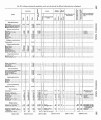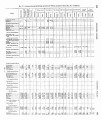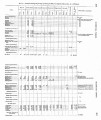| OCR Text |
Show 6 REPORT OF THE COMMISBIOFER OF INDIAN AFFAIRS. 1864; mtificaticn advised,with amendments, July 2, 1866. This treaty is one of great importance, as it obtained a cession of a tract of land in the cent,ral and southern part of Oregon, amounting to about 11,500,000 acres, reserving from this, however, a tract of moderate extent around and including the Klamath lakes, for a pelmanent home for these Indians and others who may be located upon it. This cession is obtained at a less expenditure of money than any 'other of like extent for many yeaya. 'Fhe government agrees to expend in the aggregate, for the benefit of the Indians, during a term of fifteeen years, the sum of $50,000, besides paying $35,000 for the establishment of the Indians . upon the reservation. Gristand saw mills, mechanics' shops and agency build-ings are to be erected and kept in repair for twenty years, and thE employ& paid by govornmment ; while provisions are made for the eventual survey and allotment of the lands when the condition of the Indians may demand such action. moll-vah-we Snakes: Concluded Auaast 12,1865: ratification advised Julv 5 , l';~(;,'~ud'~~.,,clnilnJcudl y 10, l$ti6." l'llis is n s ~ ~ ~ ~ l r ~ i~rrl,trtyn tot ntl&r ~ otlc nrxr pwc..<linf, nurl brings ~ l l rrr iLt wirhirr rh,. provicions of r h ~ ttr esty with l i l t l t : ~d,lirir,n,alr xl~ondirurr. TIw Lnnd rrdrs a cq~naider.il,let rnct of Innd in central Oregon, and &is to receive $5,000 towards the expenses of removal to and settlement upon the Klamath Lake reservation, and to have $2,000 per annum expended in its behalf for the first five years after the ratification of the treaty, and $1,200 per annnm for the next ten yeers. The long delay in the ratification of these treaties has made a portion of the Indians quite uneasy, hut it is hoped that when they learn t.hat the funds are ready to be used for their benefit, they will come in peaceably to the reservation, and enjoy the great ad-vantages sccured to them. ch;PpewnsofSaginaw, &.: Concluded October IS, 1864; ratification advised May 22, 1866, with amendment; amendment accepted June 18, 1866, and pro-claimed August 16, 1866. By this treaty, the Indians release to the govern-ment certain townships reserved to them upon the Saginaw bay, in Michigan, and also yield the right heretofore held by them to locate certain lands elsewhere in that State. The government sets apart for their use all the unsold land in six townships in Isabella county. The sum of $20,000 is to be given them for a manual labor school, to be under the charge of the Methodist Board of Mis-sions, if they will expend $3,000 in the erection of buildings. Omahas: Concluded March 6,1865;~atificationa dvised February 13, 1866; ratified F e h n ~ a ~15y, 1966. I n the early spring of 1864, the Winnebagoes, who had been removed to a reservation far up the Missouri river, but, being an-able to obtain a living upon it, had abandoned it, and spent the winter amidst much suffering in the vicinity of Fort fialtdall, came down the river and sought a temo, orar,v refuee with the Omahas in Nebraska: and this treatv was made with tllr 1iirrt.r tribe in oldrr. tu prt,viJr n pel.rnlnnent homc f'nr f1.r M ' ~ ~ ~ I v ~ I ? I ~ u ~ 'I'l~t.O mnhns 1 . d mun 1nl.d that, tllrv nrr,drd, hriny :tbu~itt o ucci:).t nllotmr.11ts and settle down to the nractice of aerioultural ind;t.t~.v, and readav agreed to n " ,, dell nrarly loaliof t l ~ i rrr scrvntior~t o 111; gorrrwncnr, rcfeivi~g tl,rrrror JT,O,O(IU, tu be c!rl)c~~ldct.:,lr p,o;l., pruri~ion.e~.a, ~tl:, nnd hl r i ldin~:, t r ~ l , 1 1 5 ~o l,r.~inir~g 11.1, rxte~~siaonit lle ~ r ~ l ' i z i o ~ ~ ~ ~ .i.ii~rhr~ro ii erlwl eit. Ihrn~wt.r cntv ibl. t l n yeilrs. They also are to rdceive $7,000 fox. damkes done to their resGvation gy the TVinnebagoes previous to the tyeaty. Winne6agoes: Concluded March 8, 1865; ratification advised with arnend-ment February 13, 1866; amendment accepted Februa~y2 0, 1366; proclaimed March 28, 1866. The general purposes of this treaty are stated above. The Winnebagoes have suffered sadly of late years, fiom no fault of their own. The exasperated state s f mind in which the frontier settlers of JIin~~esowtae re left by the Sioux massacre of 1862 left no alternative but to remo7-e the Winneba-goes from the State, the ve1.y garden of which they owned, and tilled the lands |























































































